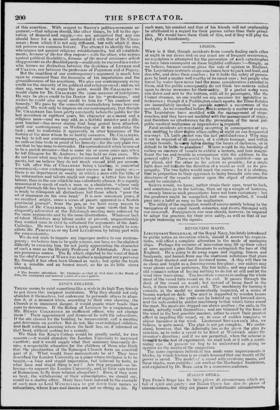LIGHTS.
WHY is it that, though accidents from vessels fouling each other at night in our rivers and on our coast are of frequent occurrence,
no regulation is attempted for the prevention of such catastrophes as have been consequent on these frightful collisions ?—Simply, as we believe, because custom gives the rule of opinion in England. The Legislature instructs stage-coachmen how to pack and load, and describe, and drive their coaches ; for it holds the safety of passen- gers by land a matter well worthy of its nicest care ; but people who travel by water have never had the same consideration extended to them, and the public consequently do not think law-makers called upon to devise measures for theinsafety. If a packet a-day were run down and sent to the bottom, with all its passengers, like the Comet steamer, no one would see any occasion for legislative in- terference; though if a Paddington coach upsets, the Three Estates are immediately invoked to provide against a recurrence of the
accident. As we remaiked before, is is entirely a matter of custom. The Legislature have meddled with the management of stage-
coaches, and they have not meddled with the management of ships ; and therefore no interference for the prevention of the most pal- pable nautical negligence or imprudence La requirdd.
Fatal accidents are constantly occurring in consequence of ves- sels omittingto show eights when sailing si night on our frequented
sea-ways. (A Leith psicket was the last published case.) Why may it not be required of all coasters, of a certain tonnage, and within certain bounds, to cariy lights during the hours of darkness, or in default to be liable to penalties? Where would be the hardship of calling on masters of vessels to exhibit a lantern, and how insigni- ficant the tax and trouble in comparison with the addition to the general safety ? , There ought to be two lights exhibited—one as far ahead, and the other as far astern as possible ; for a single light does not indicate the direction of a vessel as well as its pro- pinquity. The two lights would mark the course ; for it is obvious, that in proportion to their approach to being brought into one, the directness of the vessel's course upon the object of observation would be calculated.
Sailors would, we know, rather strain their eyes, trust to luck, and sometimes go to the bottom, than set up a couple of lanterns, —merely because such precautions have not been customary : but the prudence might be compelled, and once compelled, it would pass into a habit as easy as the negligence.
The utility of the regulation would of course mainly belong to the navitration of our coast board, estuaries, and rivers, thronged with our own craft. Foreig-ners in our seas should, however, be required to adopt the practice, for their own safety, as well as that of our people reckoning on the signals.


















 Previous page
Previous page